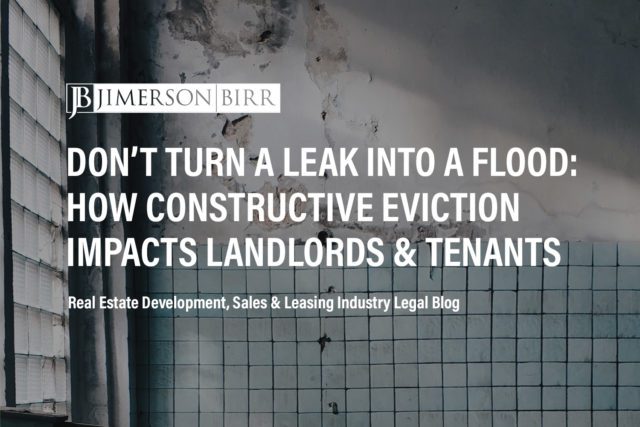What do unlawful eviction, entry, and detainer encompass?
Unlawful eviction, unlawful entry, and unlawful detainer are three terms often used in commercial landlord-tenant leasing disputes in Florida. Wrongful eviction occurs when a landlord forces a tenant out of the leased property without following legal procedures. For example, wrongful eviction includes changing the locks, shutting off utilities, or removing the tenant’s belongings without a court order. In contrast, unlawful entry refers to a landlord entering the leased property without the tenant’s consent or proper notice, which may violate the tenant’s right to privacy under Florida Statute § 83.53.
On the other hand, an unlawful detainer is when a tenant continues to occupy the property without a valid lease after the lease has ended or when the tenant has failed to pay rent as required. To resolve an unlawful detainer issue, a landlord must file an action in court under Florida Statute § 82.04 seeking a judgment for possession. For example, if a commercial tenant’s lease expires and they continue to occupy the property without a new agreement, the landlord may pursue an unlawful detainer action to regain possession.
Need a commercial leasing advocate? Schedule your consultation today with a top commercial landlord/tenant leasing attorney.
Which laws and regulations apply to unlawful eviction, entry, and detainer in Florida?
n Florida, laws and regulations surrounding unlawful eviction, unlawful entry, and unlawful detainer can be found in Title VI, Chapter 83 of the Florida Statutes, specifically Part I (Residential Tenancies) and Part II (Commercial Tenancies). Although these sections primarily focus on residential tenancies, they provide valuable guidance for commercial landlord-tenant relationships.
For unlawful eviction and entry, landlords must adhere to the notice requirements found in Florida Statute § 83.53 and the eviction process outlined in Florida Statute § 83.59. For unlawful detainer cases, the applicable provisions are in Chapter 82, specifically Florida Statute § 82.04, which governs the process for initiating a court action for possession.
How do unlawful eviction, entry, and detainer commonly lead to litigation between commercial landlords and tenants?
The following issues commonly lead to litigation:
- Noncompliance with eviction procedures: A landlord may fail to follow the legally required eviction process under Florida Statute § 83.59, resulting in unlawful eviction and potential litigation.
- Violation of tenant’s privacy rights: Tenants may sue landlords for unlawful entry if they violate Florida Statute § 83.53 by entering the leased property without proper notice or consent.
- Improper handling of security deposits: Disputes over security deposits, governed by Florida Statute § 83.49, can lead to litigation if the landlord fails to return the deposit or provide adequate justification for withholding it.
- Unlawful detainer actions: A landlord may file an unlawful detainer action under Florida Statute § 82.04 to regain possession of the property, which can result in litigation if the tenant contests the action.
When a set of facts is appropriate for legal intervention, there are many paths a claimant may take. We are value-based attorneys at Jimerson Birr, which means we look at each action with our clients from the point of view of costs and benefits while reducing liability. Then, based on our client’s objectives, we chart a path to seek appropriate remedies.
To determine whether your unique situation may necessitate litigation or another form of specialized advocacy, please contact our office to set up your initial consultation.
Frequently Asked Questions
- Can a commercial landlord evict a tenant without going to court?
No, a landlord must follow the legal eviction process outlined in Florida Statute § 83.59 before removing a tenant from the property. This process requires the landlord to provide proper notice and obtain a court order before evicting the tenant.
- What remedies are available to tenants if their landlord commits an unlawful eviction or entry?
A tenant may seek legal remedies such as monetary damages, injunctive relief, or the return of possession of the property if their landlord commits an unlawful eviction or entry. Tenants should consult a qualified attorney to discuss their rights and options under Florida law.
- When must a landlord file an unlawful detainer action after the tenant has overstayed their lease?
There is no specific deadline for filing an unlawful detainer action in Florida. However, the sooner a landlord files the action, the more likely they are to promptly regain possession of the property. Therefore, commercial landlords should consult with an attorney to discuss their options and ensure compliance with Florida law.
Have more questions about how commercial leasing could impact your business?
Crucially, this overview of unlawful eviction, entry, and detainer does not begin to cover all the laws implicated by this issue or the factors that may compel the application of such laws. Every case is unique, and the laws can produce different outcomes depending on the individual circumstances.
Jimerson Birr attorneys guide our clients to help make informed decisions while ensuring their rights are respected and protected. Our lawyers are highly trained and experienced in the nuances of the law, so they can accurately interpret statutes and case law and holistically prepare individuals or companies for their legal endeavors. Through this intense personal investment and advocacy, our lawyers will help resolve the issue’s complicated legal problems efficiently and effectively.
Having a Jimerson Birr attorney on your side means securing a team of seasoned, multi-dimensional, cross-functional legal professionals. Whether it is a transaction, an operational issue, a regulatory challenge, or a contested legal predicament that may require court intervention, we remain tireless advocates at every step. Being a value-added law firm means putting the client at the forefront of everything we do. We use our experience to help our clients navigate even the most complex problems and come out the other side triumphant.
If you want to understand your case, the merits of your claim or defense, potential monetary awards, or the amount of exposure you face, you should speak with a qualified Jimerson Birr lawyer. Our experienced team of attorneys is here to help. Call Jimerson Birr at (904) 389-0050 or use the contact form to schedule a consultation.


We live by our 7 Superior Service Commitments
- Conferring Client-Defined Value
- Efficient and Cost-Effective
- Accessibility
- Delivering an Experience While Delivering Results
- Meaningful and Enduring Partnership
- Exceptional Communication Based Upon Listening
- Accountability to Goals










